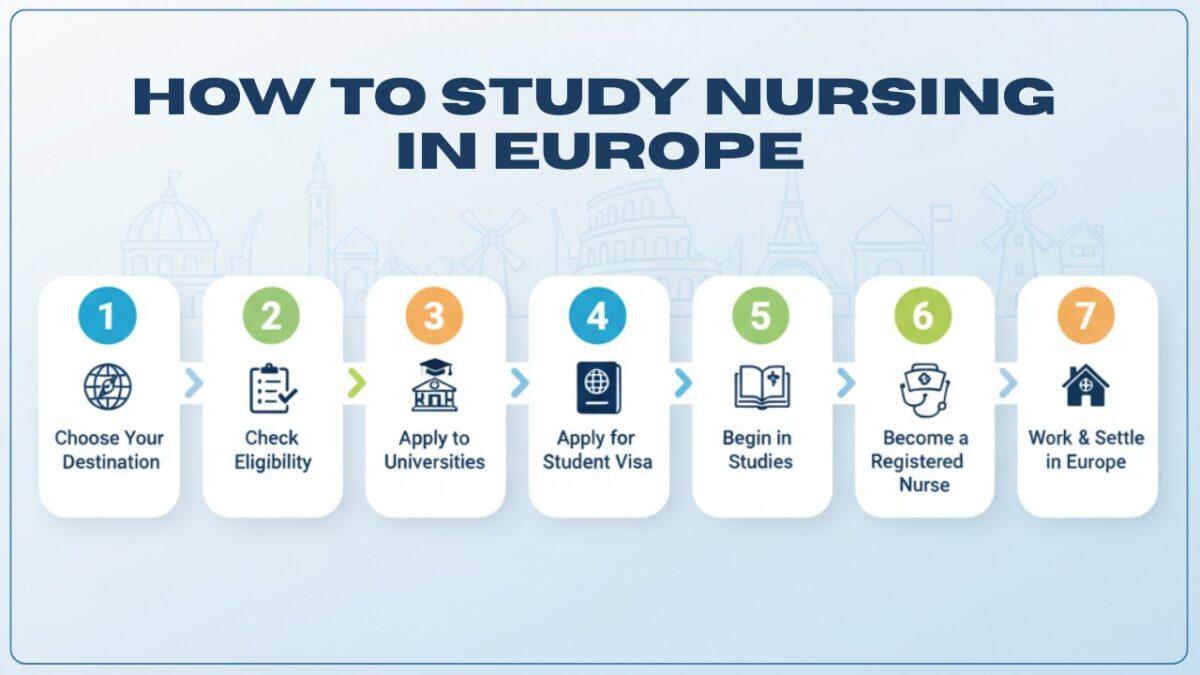If you’ve always dreamed of working and settling in Europe as a Registered Nurse, this could be your golden opportunity. European countries like Bulgaria, Georgia, and Albania have become top choices for international nursing aspirants — thanks to their low tuition fees, English-taught programs, No IELTS requirement and Free German and Italian Language Training.
Let’s understand why studying nursing in these countries is one of the smartest career moves you can make.
1. Why Choose Nursing in Europe?
Europe has always been known for its high-quality healthcare education and global recognition of nursing qualifications. Many European universities provide practical-based learning, advanced simulation labs, Hospitals, patients interactions and international exposure that prepares students to work anywhere in the world.
The demand for qualified nurses in Europe is increasing rapidly. With an ageing population and healthcare expansion, countries across the continent are actively welcoming trained nurses — especially from India and Asia.
2. Study Nursing in Bulgaria, Georgia, and Albania
These three countries are becoming hidden gems for nursing education:
Bulgaria
Bulgaria offers one of the low tuition fees in Europe with English-medium programs. Nursing courses are approved by the European Union, allowing graduates to work across EU countries after registration.
Georgia
Georgia is popular for its world-class universities, safe environment, and affordable living costs. Nursing programs here focus on both theoretical and hands-on training, making it ideal for students who wish to settle in Western Europe later.
Albania
Albania is gaining attention for its European-standard curriculum and lowest cost of education with Free German and Italia Languages. Albania The best part — students can apply for Permanent Residency or work in any EU country after meeting the licensing criteria.
Key Benefits for International Students
1. Low Tuition & Living Costs
Compared to Western Europe or the US, Bulgaria, Georgia, and Albania offer highly affordable education options without compromising on quality.
2. No IELTS Requirement
Most universities accept students who studied in English-medium institutions, so IELTS is often not mandatory.
3. Globally Recognized Degrees
A nursing degree from these countries can open doors to careers across Europe and beyond, especially if your institution follows EU standards.
4. Hands-on Clinical Training
All programs include practical hospital training, ensuring you graduate with real-world experience.
5. Pathway to European Settlement
Graduates can apply for registration as nurses in other European countries, creating a clear path for career growth and permanent settlement.
How to Study Nursing in Europe
Facts You Should Know
-
- A Bachelor’s degree in Nursing usually takes 3–4 years.
-
- Degrees from EU countries like Bulgaria offer easier recognition across Europe.
-
- English is the medium of instruction in universities.
-
- Many institutions provide scholarships and student exchange programs.
-
- Living costs are far lower compared to Western Europe, making it budget-friendly for international students.
Career and Settlement Opportunities
After completing your nursing degree, you can:
-
- Work in hospitals, clinics, and healthcare organizations across Europe.
-
- Apply for EU nursing registration after necessary documentation.
-
- Continue advanced studies like Master’s or specialized nursing courses.
-
- Settle permanently in your country of employment after meeting residency requirements.
FAQs
Q1. Do I need IELTS to study nursing in Europe?
Not necessarily. Many universities in Georgia and Albania don’t require IELTS if you’ve studied in English earlier.
Q2. What is the total cost of studying nursing in these countries?
On average, you can expect €2,500 to €5,000 per year in tuition fees and around €300–€600 per month for living expenses.
Q3. Can I work while studying?
Yes, most European countries allow part-time work during your studies, helping cover living costs.
Q4. Will my degree be valid in other European countries?
Yes, if you study at a recognized university, your degree will be valid across the EU and other European regions.
Q5. Can I settle in Europe after completing my nursing course?
Yes. Once you’re licensed and gain professional experience, you can apply for long-term residence or permanent settlement depending on local immigration rules.
Conclusion
Studying nursing in Bulgaria, Georgia, or Albania is an excellent opportunity for students who dream of a rewarding healthcare career in Europe. With low fees, no IELTS, and a clear pathway to settlement, these destinations offer both quality education and long-term stability.
If you’re planning your next step, reach out to Migratex Study abroad Global Consultant, a trusted Schengen study visa consultant in Bangalore, to guide you through every step — from application to arrival.

